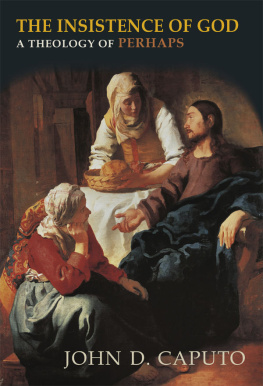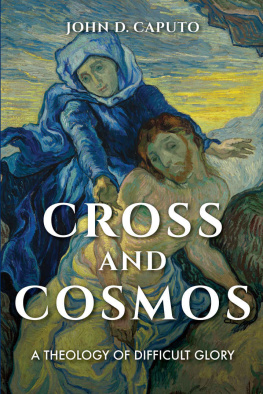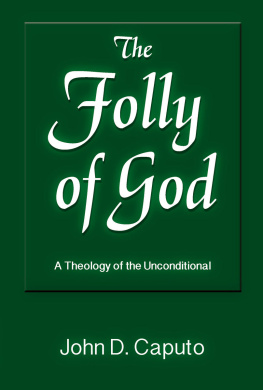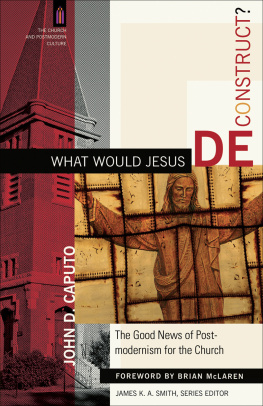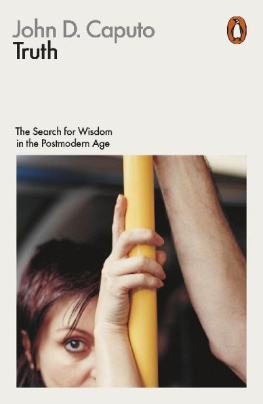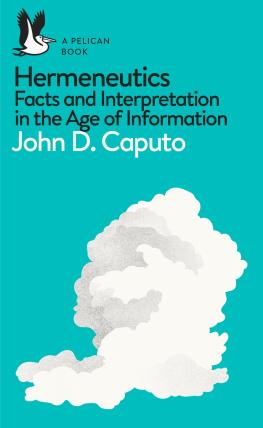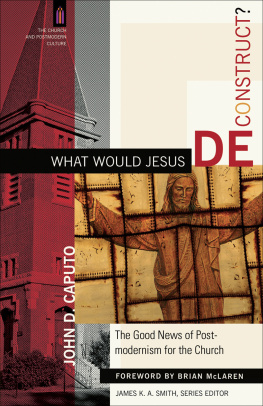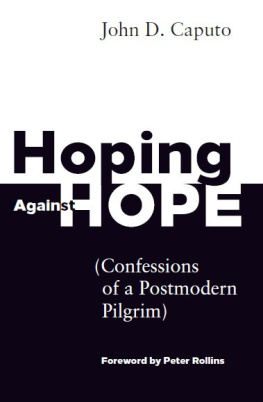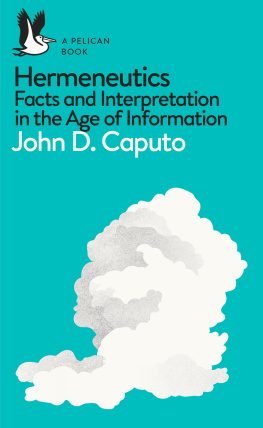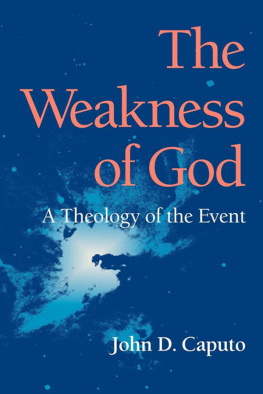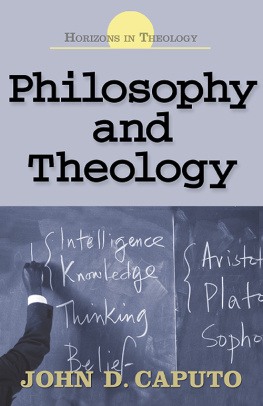John D. Caputo - The Insistence of God
Here you can read online John D. Caputo - The Insistence of God full text of the book (entire story) in english for free. Download pdf and epub, get meaning, cover and reviews about this ebook. year: 2013, publisher: Indiana University Press, genre: Religion. Description of the work, (preface) as well as reviews are available. Best literature library LitArk.com created for fans of good reading and offers a wide selection of genres:
Romance novel
Science fiction
Adventure
Detective
Science
History
Home and family
Prose
Art
Politics
Computer
Non-fiction
Religion
Business
Children
Humor
Choose a favorite category and find really read worthwhile books. Enjoy immersion in the world of imagination, feel the emotions of the characters or learn something new for yourself, make an fascinating discovery.
- Book:The Insistence of God
- Author:
- Publisher:Indiana University Press
- Genre:
- Year:2013
- Rating:4 / 5
- Favourites:Add to favourites
- Your mark:
- 80
- 1
- 2
- 3
- 4
- 5
The Insistence of God: summary, description and annotation
We offer to read an annotation, description, summary or preface (depends on what the author of the book "The Insistence of God" wrote himself). If you haven't found the necessary information about the book — write in the comments, we will try to find it.
The Insistence of God — read online for free the complete book (whole text) full work
Below is the text of the book, divided by pages. System saving the place of the last page read, allows you to conveniently read the book "The Insistence of God" online for free, without having to search again every time where you left off. Put a bookmark, and you can go to the page where you finished reading at any time.
Font size:
Interval:
Bookmark:
INDIANA SERIES IN THE PHILOSOPY OF RELIGION
Merold Westphal, editor
A Theology of Perhaps
JOHN D. CAPUTO

INDIANA UNIVERSITY PRESS
Bloomington and Indianapolis
This book is a publication of
Indiana University Press
Office of Scholarly Publishing
Herman B Wells Library 350
1320 East 10th Street
Bloomington, Indiana 47405 USA
iupress.indiana.edu
Telephone orders 800-842-6796
Fax orders 812-855-7931
2013 by John D. Caputo
All rights reserved
No part of this book may be reproduced or utilized in any form or by any means, electronic or mechanical, including photocopying and recording, or by any information storage and retrieval system, without permission in writing from the publisher. The Association of American University Presses Resolution on Permissions constitutes the only exception to this prohibition.
 The paper used in this publication meets the minimum requirements of the American National Standard for Information SciencesPermanence of Paper for Printed Library Materials, ANSI Z39.481992.
The paper used in this publication meets the minimum requirements of the American National Standard for Information SciencesPermanence of Paper for Printed Library Materials, ANSI Z39.481992.
Manufactured in the United States of America
LIBRARY OF CONGRESS CATALOGING-IN-PUBLICATION DATA
Caputo, John D.
The insistence of god : a theology of perhaps / John D. Caputo.
pages cm. (Indiana series in the philosophy of religion)
Includes bibliographical references and index.
ISBN 978-0-253-01001-8 (cloth : alk. paper) ISBN 978-0-253-01007-0 (pbk. : alk. paper) ISBN 978-0-253-01010-0 (electronic book) 1. God (Christianity) 2. PostmodernismReligious aspectsChristianity. I. Title.
BT103.C3675 2013
231dc23 2013004168
1 2 3 4 5 18 17 16 15 14 13
To my graduate students in the Religion Department at Syracuse University Where we conceived unruly and unroyal thoughts Under the very eye of King David
God as a Highest Beinga steady hand at the wheel of the universe, ordering all things to good purpose, the spanning providential eye o'erseeing allhas had a good run. But in our postmodern condition we acknowledge the instability of traditional foundations, the ambiguities of the old absolutes, and the complexity of endlessly linking systems without closure. The internet is very postmodern. The world is neither a neat, divinely run cosmos nor pure chaos but what James Joyce called so prophetically chaosmos, a dance of probabilities sometimes producing improbable results. That fits with biblical creation: in the Beginning, at the time God was creating the world, the elements were already there, as old as God. The Bible begins with a B (bet, bereshit) not an A (aleph). The first is already invaded by the second (just as deconstruction would predict). The biblical elements were too feminine for the later ex nihilo theologians who preferred a show of divine testosterone. The biblical creator had to do the best he could with what he had to work with, then hope for the best, like the rest of us. Faith is not a safe harbor but risky business. God is not a warranty for a well-run world, but the name of a promise, an unkept promise, where every promise is also a risk, a flicker of hope on a suffering planet in a remote corner of the universe. I do not believe in the existence of God but in God's insistence. I do not say God exists, but that God callsGod calls upon us, like an unwelcome interruption, a quiet but insistent solicitation. The truth of God may or may not come true. The work of theology is not to spell out the bells and whistles adorning a heavenly monarch but to meditate upon everything we are here called to, everything we are trying to recall, in and under the name (of) God. In a postmodern world, this monotheistic name does not have a monopoly. God emerges here and there, often under other names, not in the bound volumes of theology but in loose papers that describe a more underlying and insecure faith, a more restless hope, a more deep-set but unfulfilled promise or desire, a desire beyond desire that is never satisfied. I do not know what I desire when I desire God, where that non-knowing is not a lack but the open-ended venture in the human adventure, the promise/risk, the very structure of hope and expectation, not this Messiah or that, but a messianic expectation not immune from secretly hoping the Messiah never shows up. God does not bring closure but a gap. A God of the gaps is not the gap God fills, but the gap God opens. The name of God makes the present a space troubled by an immemorial past and an unforeseeable future. Good, good, indeed very good. Perhaps. That is not a declaration of fact but a promise on which we are expected to make good, an insistence whose existence we are expected to deliver. And nobody is guaranteeing anything.
Most of this book has been previously unpublished, but some sections have appeared in earlier versions that have been rewritten often beyond recognition but deserve acknowledgment:
God, Perhaps: The Diacritical Hermeneutics of God in the Work of Richard Kearney, in Philosophical Thresholds: Crossings of Life and World, ed. Cynthia Willett and Leonard Lawlor, SPEP supplement, Philosophy Today 55 (2011): 5664.
Hospitality and the Trouble with God, in Phenomenologies of the Stranger: Between Hostility and Hospitality, ed. Richard Kearney and Kascha Semonovitch (New York: Fordham University Press, 2011), 8397.
The Perversity of the Absolute, the Perverse Core of Hegel, and the Possibility of Radical Theology, in Hegel and the Infinite: Religion, Politics, and Dialectic, ed. Clayton Crockett, Creston Davis, and Slavoj iek (New York: Columbia University Press, 2011), 4766.
The Gap God Opens, Tikkun 25, no. 2 (MarchApril 2010): 41.
Review of The Monstrosity of Christ: Paradox or Dialectic? by Slavoj iek and John Milbank, ed. Creston Davis, Notre Dame Philosophical Reviews 2009.09.33.
The Invention of Revelation: A Hybrid Hegelian Approach with a Dash of Deconstruction, in Revelation: Claremont Studies in the Philosophy of Religion, Conference 2012, ed. I. U. Dalferth and M. Ch. Rodgers (Tbingen: Mohr Siebeck, forthcoming).
The Future of Continental Philosophy of Religion, conference, Syracuse University, April 79, 2011.
Radical Theology as Theopoetics, in Theopoetic Folds: Philosophizing Multifariousness, ed. Roland Faber and Jeremy Fackenthal (New York: Fordham University Press, 2012).
Voir Venir: How Far Plasticity Can Be Stretched, in Plastique: The Dynamics of Catherine Malabou, ed. Tyler Williams and Jarrod Abbott, special issue, 16 (2012): 107123.
My thanks to Sharon Baker, John Burkey, Clayton Crockett, Neal Deroo, T. Wilson Dickinson, Christina Gschwandtner, Brad Jersak, Katharine Sarah Moody, Michael Norton, B. Keith Putt, William Robert, Jeffrey Robbins, Phil Snider, Eric Weislogel, and Merold Westphal for reading this manuscript and offering many valuable suggestions that sent me back to the drawing board and have saved me from myself several times over.
Above all, I thank my graduate students in the Religion Department at Syracuse University, upon whom the ideas in this book were first tested and to whom this book is dedicated with much gratitude and love.
Font size:
Interval:
Bookmark:
Similar books «The Insistence of God»
Look at similar books to The Insistence of God. We have selected literature similar in name and meaning in the hope of providing readers with more options to find new, interesting, not yet read works.
Discussion, reviews of the book The Insistence of God and just readers' own opinions. Leave your comments, write what you think about the work, its meaning or the main characters. Specify what exactly you liked and what you didn't like, and why you think so.

